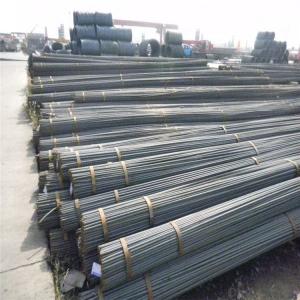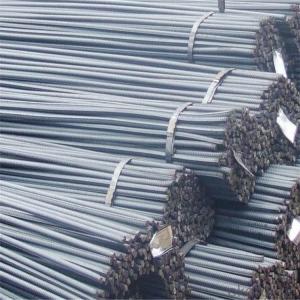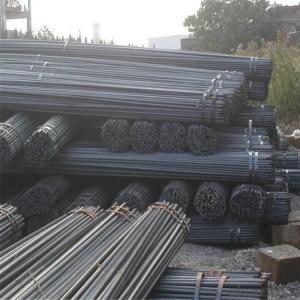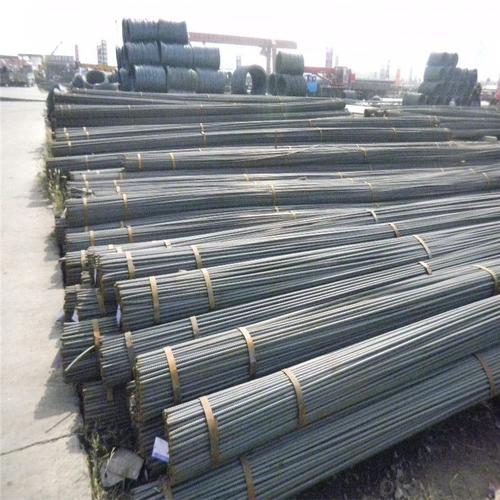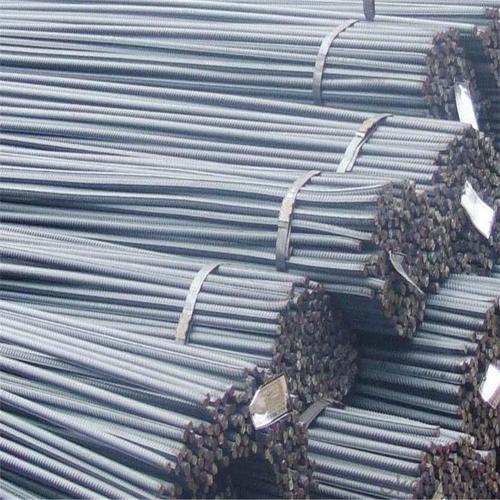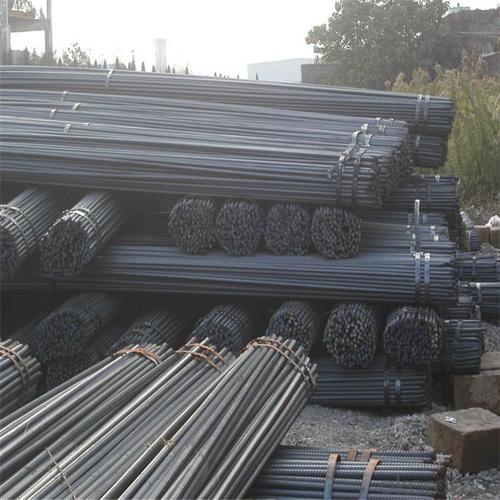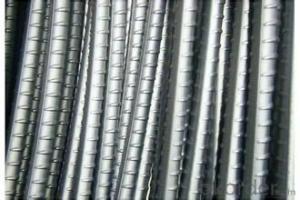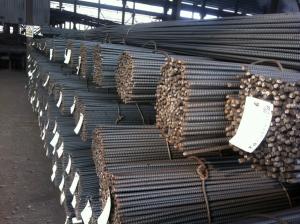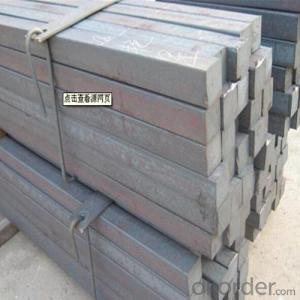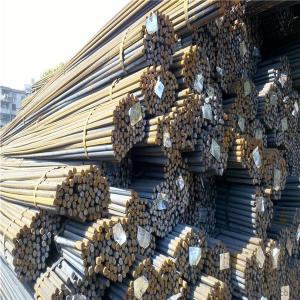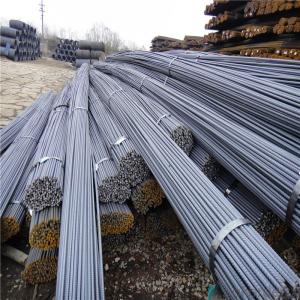Deformed Steel Bars Specification
- Loading Port:
- Tianjin
- Payment Terms:
- TT OR LC
- Min Order Qty:
- 170 m.t.
- Supply Capability:
- 50000 m.t./month
OKorder Service Pledge
OKorder Financial Service
You Might Also Like
Specification
Deformed Steel Bars Specification
Description of Deformed Steel Bars Specification
1, Diameter: 5.5mm-10mm Deformed Steel Bars Specification
10m- 40mm Deformed Steel Bars Specification
2, Length: 6m, 9m, 12m or customized
3, Standard: GB, ASTM, AISI, SAE, DIN, JIS, EN
OEM technology - send detailed technical parameters for accurate quotation.
2, Produce Process: smelt iron - EAF smelt billet - ESR smelt billet -
hot rolled or forged to get the steel round bar and plate
3, Heat Treatment: annealing, normalizing, tempering, quenching
4, Surface Treatment: Black
5, Quality Assurance: We accept third party inspection for all orders.
You can ask testing organizations such as SGS, BV, etc. to test our products before shipping.
Chemical Composition of Deformed Steel Bars Specification
Grade | Technical data of the original chemical composition(%) | |||||
Reinforcing steel bar HRB335 | C | Mn | Si | S | P | B |
≤0.25 | ≤1.60 | ≤0.80 | ≤0.045 | ≤0.045 | >0.0008 | |
Physics Capability | ||||||
Yield Strength(N/cm2) | Tensile Strength(N/cm2) | Elongation(%) | ||||
≥ 335 | ≥490 | ≥16 | ||||
Reinforcing steel bar HRB400 | C | Mn | Si | S | P | B |
≤0.25 | ≤0.16 | ≤0.80 | ≤0.045 | ≤0.045 | 0.04-0.12 | |
Physics Capability | ||||||
Yield Strength(N/cm2) | Tensile Strength(N/cm2) | Elongation(%) | ||||
≥ 400 | ≥ 570 | ≥ 14 | ||||
Products Show of Deformed Steel Bars Specification
Company Information
CNBM International Corporation is the most important trading platform of CNBM group.
Whith its advantages, CNBM International are mainly concentrate on Cement, Glass, Iron and Steel, Ceramics industries and devotes herself for supplying high qulity series of refractories as well as technical consultancies and logistics solutions.


F A Q
1, Your advantages?
professional products inquiry, products knowledge train (for agents), smooth goods delivery, excellent customer solution proposale
2, Test & Certificate?
SGS test is available, customer inspection before shipping is welcome, third party inspection is no problem
3, Factory or Trading Company?
CNBM is a trading company but we have so many protocol factories and CNBM works as a trading department of these factories. Also CNBM is the holding company of many factories.
4, Payment Terms?
30% TT as deposit and 70% before delivery.
Irrevocable L/C at sight.
5, Trading Terms?
EXW, FOB, CIF, FFR, CNF
6, After-sale Service?
CNBM provides the services and support you need for every step of our cooperation. We're the business partner you can trust.
For any problem, please kindly contact us at any your convenient time.
We'll reply you in our first priority within 24 hours.
- Q: What are the key properties of special steel?
- Special steel has several key properties that set it apart from regular steel. These include high strength, excellent corrosion resistance, good wear resistance, and superior heat resistance. Special steel is also characterized by its ability to withstand extreme temperatures and pressure, making it suitable for critical applications in industries such as aerospace, automotive, and construction. Additionally, special steel can be easily machined and welded, allowing for greater versatility in manufacturing processes.
- Q: How does special steel perform in high-impact applications?
- Special steel is specifically designed to excel in high-impact applications. It is engineered with unique properties that enable it to withstand extreme forces and impacts without deforming or breaking. One of the key features of special steel is its high strength and hardness, which allows it to absorb and distribute impact forces effectively. This helps prevent the material from shattering or deforming under heavy loads, making it ideal for applications such as construction machinery, automotive parts, and industrial equipment. Moreover, special steel also exhibits excellent toughness, which means it can resist cracking or fracturing when subjected to sudden and intense impacts. This is crucial in high-impact applications where the material needs to endure repeated forces without failure. The toughness of special steel is achieved through careful alloying and heat treatment processes, which enhance its ability to absorb energy and resist fracture. In addition, special steel often possesses superior wear resistance, corrosion resistance, and heat resistance properties, which contribute to its overall performance in high-impact applications. These enhanced features enable the material to maintain its integrity and functionality even when exposed to harsh environments or extreme temperatures. Overall, special steel demonstrates exceptional performance in high-impact applications due to its high strength, toughness, wear resistance, corrosion resistance, and heat resistance. These properties make it a reliable and durable choice for industries that require materials capable of withstanding intense forces and impacts.
- Q: How does special steel perform in high-temperature fatigue?
- Special steel is renowned for its outstanding performance in conditions of high-temperature fatigue. When exposed to elevated temperatures, special steel demonstrates qualities such as remarkable strength, exceptional resistance to creep, and superior thermal stability. These characteristics render it highly dependable and capable of enduring extended periods of exposure to extreme temperatures without significant deterioration in performance. One of the key factors contributing to special steel's exceptional performance in high-temperature fatigue is its distinct composition. Typically, it contains alloying elements like chromium, molybdenum, and vanadium, which enhance its strength at high temperatures and resistance to thermal fatigue. These alloying elements create stable carbides and nitrides that aid in preserving the material's structural integrity even under intense heat and cyclic loading. Furthermore, special steel undergoes specialized heat treatment procedures, such as quenching and tempering, to further enhance its properties in high-temperature fatigue. These treatments augment the material's microstructure, resulting in increased strength, toughness, and resistance to thermal fatigue. In conditions of high-temperature fatigue, special steel exhibits remarkable fatigue strength and durability, even when subjected to cyclic loading at elevated temperatures. Its high-temperature fatigue limit surpasses that of regular steel significantly, enabling it to withstand repetitive stress and strain without experiencing premature failure. This makes special steel an ideal choice for applications involving high-temperature environments, such as gas turbines, heat exchangers, and aerospace components. To conclude, special steel delivers exceptional performance in high-temperature fatigue conditions due to its unique composition, specialized heat treatment processes, and superior mechanical properties. Its high strength, resistance to creep, and thermal stability make it a reliable and long-lasting material for applications requiring prolonged exposure to extreme temperatures.
- Q: What are the main factors affecting the heat resistance of special steel?
- The main factors affecting the heat resistance of special steel include its composition, microstructure, and processing techniques. The composition of the steel, particularly the presence of alloying elements such as chromium, nickel, and molybdenum, can greatly influence its ability to withstand high temperatures. Additionally, the microstructure of the steel, which is determined by factors like heat treatment and grain size, plays a significant role in its heat resistance. Finally, the processing techniques used during the manufacturing of the steel, such as forging or casting, can also impact its ability to withstand heat.
- Q: What are the different forging techniques for special steel parts?
- There are several forging techniques that can be used for special steel parts, including open die forging, closed die forging, and ring rolling. Open die forging involves shaping the steel by repeated hammering or pressing between flat dies, allowing for a range of shapes and sizes. Closed die forging, on the other hand, utilizes specially designed dies to shape the steel into a specific form, resulting in higher precision. Ring rolling involves shaping a circular piece of steel into a seamless ring by applying pressure from radial rolls. These techniques offer varying advantages depending on the desired shape, size, and properties of the special steel part being forged.
- Q: How does special steel contribute to improving product performance?
- Special steel contributes to improving product performance in several ways. Firstly, special steel has superior strength and durability compared to regular steel, making it more resistant to wear, corrosion, and impact. This increased durability ensures that products made with special steel have a longer lifespan and can withstand harsh conditions, ultimately enhancing their performance and reliability. Additionally, special steel can be tailored to have specific characteristics, such as high temperature resistance or magnetic properties, which can be crucial for certain applications. By using special steel, manufacturers can create products with enhanced functionality, efficiency, and safety, ultimately leading to improved overall performance.
- Q: What are the common challenges in casting special steel?
- Casting special steel can pose several challenges due to its unique properties and composition. Some of the common challenges in casting special steel include: 1. High melting point: Special steels often have higher melting points compared to regular carbon steels. This requires the use of specialized equipment and techniques to achieve the required temperature for casting. 2. Alloying elements: Special steels often contain alloying elements such as chromium, nickel, molybdenum, or vanadium. These elements enhance the steel's properties but can also increase the complexity of the casting process. Proper control and understanding of the alloying elements are necessary to ensure the desired mechanical properties in the final product. 3. Oxidation and decarburization: During the casting process, special steel can be susceptible to oxidation and decarburization. The high temperatures and exposure to oxygen can result in surface defects and loss of carbon content, which can compromise the steel's strength and hardness. Careful control of the casting parameters, such as atmosphere and mold design, is necessary to minimize these issues. 4. Shrinkage and porosity: Special steels often have a higher shrinkage rate during solidification compared to regular steels. This can result in shrinkage defects and porosity within the castings. Proper gating and riser design, as well as the use of suitable feeding systems, are crucial to mitigate these issues and ensure sound castings. 5. Thermal stresses: Special steels may exhibit higher thermal expansion coefficients, which can lead to significant thermal stresses during the cooling and solidification process. These stresses can cause cracking and distortion in the castings. Proper design considerations, such as the use of chills or controlled cooling techniques, are essential to minimize thermal stress and maintain dimensional stability. 6. Machinability: Special steels, particularly those with high alloy content, can be challenging to machine due to their hardness and toughness. Casting defects such as inclusions, segregations, or non-uniform microstructure can further complicate the machining process. Proper selection of cutting tools and machining parameters is necessary to achieve the desired dimensional accuracy and surface finish. In summary, casting special steel presents several challenges related to high melting points, alloying elements, oxidation, shrinkage, porosity, thermal stresses, and machinability. Overcoming these challenges requires a thorough understanding of the material properties, precise process control, and the implementation of appropriate casting techniques.
- Q: What is the role of heat treatment in special steel?
- Heat treatment plays a crucial role in enhancing the properties and performance of special steel. Special steel refers to alloys that are specifically designed to have unique characteristics, such as high strength, corrosion resistance, or heat resistance. Heat treatment involves subjecting the steel to controlled heating and cooling processes to alter its microstructure, resulting in desired properties. One of the key roles of heat treatment in special steel is to improve its mechanical properties. By carefully controlling the heating temperature and cooling rate, the steel's hardness, strength, and toughness can be enhanced. For example, through processes like quenching and tempering, special steel can be made significantly stronger and more resistant to wear and fatigue. This makes it suitable for applications where high strength and durability are required, such as in the construction of machinery, tools, or aerospace components. Heat treatment also helps to optimize the steel's resistance to corrosion. Special steel is often used in environments where it is exposed to harsh conditions, such as corrosive chemicals or high temperatures. By subjecting the steel to specific heat treatment processes, like annealing or precipitation hardening, the steel can develop a more stable microstructure that improves its resistance to corrosion and oxidation. This ensures that the special steel maintains its integrity and performance even in challenging environments. Furthermore, heat treatment can modify the steel's heat resistance properties. Special steel is frequently used in applications where it is exposed to high temperatures, such as in the manufacturing of turbines or exhaust systems. Through heat treatment techniques like normalization or hardening, the steel can be made more resistant to deformation, cracking, or softening at elevated temperatures. This enables the special steel to retain its strength and structural integrity even under extreme heat conditions. In summary, heat treatment plays a crucial role in optimizing the mechanical, corrosion resistance, and heat resistance properties of special steel. By carefully manipulating the steel's microstructure through controlled heating and cooling processes, heat treatment enhances the steel's strength, durability, and performance, making it suitable for a wide range of demanding applications.
- Q: What are the main applications of special steel?
- The main applications of special steel include the manufacturing of tools, machinery, and equipment used in industries such as automotive, aerospace, construction, and energy. It is also widely used in the production of cutlery, surgical instruments, and various components for infrastructure and engineering projects. Special steel's properties, such as high strength, corrosion resistance, and heat resistance, make it indispensable in these sectors where durability, reliability, and performance are crucial.
- Q: How does special steel perform under extreme temperatures?
- Special steel has been specifically engineered to excel in extreme temperature conditions. It boasts outstanding strength, hardness, and heat resistance, making it an ideal choice for applications involving extreme heat or cold. When exposed to high temperatures, special steel maintains its structural integrity, avoiding significant deformation or loss of strength. It also retains its hardness and dimensional stability, ensuring that it can withstand extreme conditions without compromising its performance. One of the key properties of special steel is its exceptional resistance to thermal expansion and contraction. This is particularly important when faced with drastic temperature changes. By expanding and contracting uniformly, the steel minimizes the risk of cracking or other types of damage. Furthermore, special steel exhibits remarkable heat resistance, allowing it to preserve its mechanical properties even at elevated temperatures. It demonstrates high creep resistance, which means it can resist deformation under constant stress in high-temperature environments. This ensures that the steel can endure prolonged exposure to extreme heat without experiencing failure or degradation. Not only does special steel perform exceptionally well at high temperatures, but it also excels in extremely low temperatures. It maintains its toughness and ductility, with minimal risk of embrittlement or cracking. This makes it highly suitable for cryogenic environments in industries such as aerospace or medicine. In conclusion, special steel has been specifically designed to outperform in extreme temperature conditions, offering impressive strength, hardness, and heat resistance. Its ability to maintain structural integrity, resist thermal expansion and contraction, and withstand high or low temperatures make it a dependable choice for various demanding applications.
Send your message to us
Deformed Steel Bars Specification
- Loading Port:
- Tianjin
- Payment Terms:
- TT OR LC
- Min Order Qty:
- 170 m.t.
- Supply Capability:
- 50000 m.t./month
OKorder Service Pledge
OKorder Financial Service
Similar products
Hot products
Hot Searches
Related keywords
